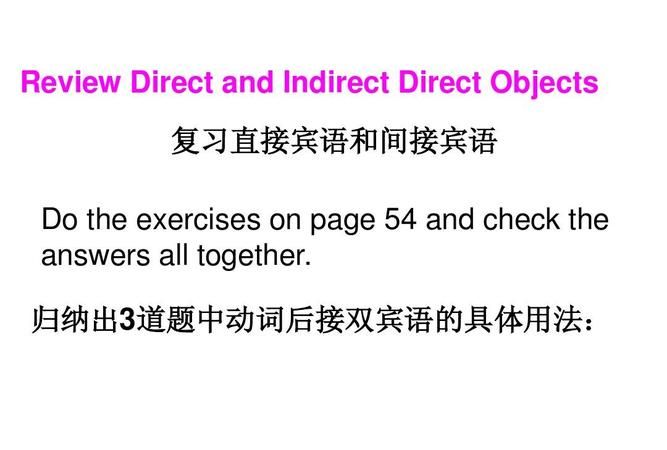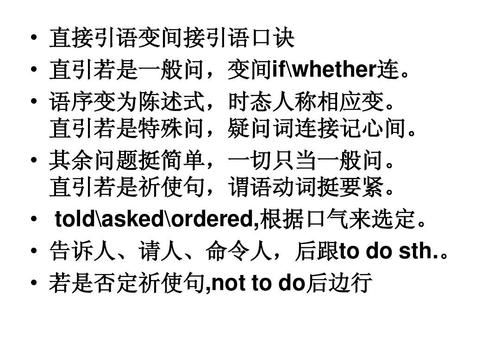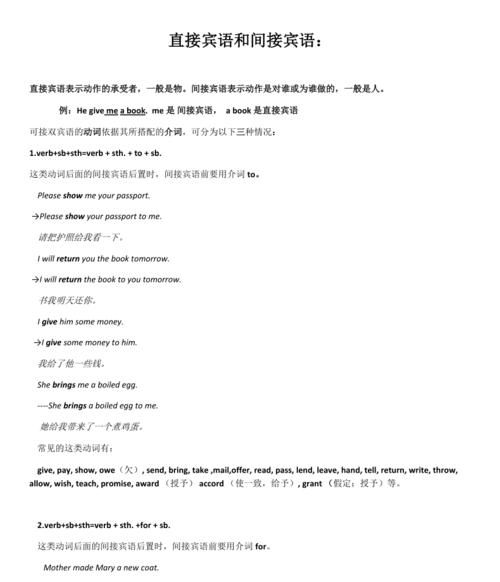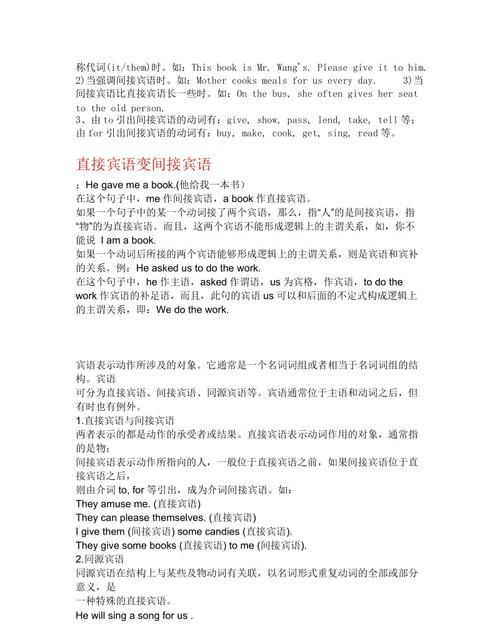本文目录
直接宾语变间接宾语的时态变化
直接引语与间接引语 一、直接引语与间接引语的转换 在将直接引语转换为间接引语时,不仅句式上要有变化,而且要在时态、人称、时间、地点等方面作相应的变化。 1、引语转换时的句式变化不同的直接引语句式,如:陈述句、疑问句、祈使句和感叹句,转换成间接引语时要遵循一定的句式转换规则,还要注意根据句意,使用适当的引述动词。(1)陈述句的间接引语将陈述句转换为间接引语,通常用that引导的宾语从句来表达。连词that 在不引起歧义的情况下可以省略。引述分句的动词常见的有say 和tell等。He said, “I caught[k�0�0:t] a cold yesterday.” 他说:“我昨天感冒了。”à He said (that) he had caught a cold the day before. 他说他前天感冒了。Helen said to me, “I’m tired of taking such exams[iɡ’z�0�3m].” 海伦说:“我讨厌参加这种考试。”à Helen told me (that) she was tired of taking such exams. 海伦说她讨厌参加这种考试。
【点津坊】若直接引语是两个并列的陈述句,要注意在第二个宾语从句前加连词that。如:He said (that) he was leaving for Europe [’j�0�3�0�5r�0�5p]the next week and that (不省略)he would stay there for half a year. 他说他下周要到欧洲去并在那里呆半年。 He said (that) the book was very interesting and that(不省略) all the children like to read it.他说那本书很有趣,所有小孩都喜欢读。 例题: He says,“I like singing and I want to be a singer.” 他说:“我喜欢唱歌,我想当歌手。” →He says that he likes singing and that he wanted to be a singer.他说他喜欢唱歌,想当歌手。 在此种情况下,引导第一个宾语从句的that有时可以省略,但引导第二个宾语从句的that通常不省略,以免误解。 (2)疑问句的间接引语直接引语如果是疑问句,变成间接引语后,叫做间接问句。引述的动词常用ask, wonder, want to know等。间接问句的词序一般都用正常词序,句末不用问号,用句号。 ①一般疑问句的间接引语直接引语为一般疑问句时,用连词whether或if 引导。I asked him, “Are you satisfied[’s�0�3t�0�1s'fa�0�1d] with the results[ri'z�0�5lt] ?” 我问他:“你对这结果满意吗?” I asked him whether / if he was satisfied with the results. 我问他对这结果是否满意。 “Did you go to the British ['br�0�1t�0�1�0�6]Museum yesterday?” asked Kate.凯特问:“你昨天有没有去大英博物馆?”Kate asked me whether / if I had gone to the British Museum the day before. 凯特问我昨天有没有去大英博物馆。 The old man said to a passer-by, “Will you tell me the way to get to the Great Wall Hotel?”那位老人跟一位过路人说:“请问到长城饭店的路怎么走。” The old man asked a passer-by to tell him the way to the Great Wall Hotel.那位老人请一位过路人告诉他去长城饭店的路。 ②选择疑问句的间接引语直接引语为选择疑问句时,用连词whether/if…or…引导。 whether可接or not, 也可接带to不定式。 if 则不可He said, “Are you interested in English or not?” 他说:“你是否对英语感兴趣?” He asked (me) whether I was interested in English or not. 他问我是否对英语感兴趣。 “Do you like Chinese food or Japanese food?” he asked. 他问:“你喜欢中国食物还是日本食物?” He asked whether / if I liked Chinese food or Japanese food. 他问我喜欢中国食物还是日本食物。 ③特殊疑问句的间接引语直接引语为特殊疑问句,转换为间接引语时,仍用原来的疑问词引导。“What do you do in your free time?” he asked me. 他问我:“你业余时间干什么?”à He asked me what I did in my free time. 他问我业余时间做什么。 “Why did she go to America?” Paul asked. 保罗问:“她为什么去美国?”à Paul asked why she had gone to America. 保罗问她为什么去了美国。 【小帖士】“What’s the matter with you?”和“What’s wrong with you?”改为间接引语时词序不变。He asked me what was wrong with me. 他问我出什么事了。 He asked me what was the matter with me. 他问我怎么了。 二、引语转换时的各种相应变化 直接引语转换成间接引语除了有句式的变化外,还要掌握动词时态、人称代词、指示代词、时间状语、地点状语和词序的变化。(1)动词时态的变化① 如果引述动词为现在时态,间接引语的动词可以保持原来的时态。He says, “I have been writing a novel.” 他说:“我一直在写一本小说。”à He says that he has been writing a novel. 他说他一直在写一本小说。 ② 如果引述动词为过去时态,间接引语中的时间就要往后推,即现在时间推至过去时间,过去时间推至过去的过去,将来时间推至过去将来时间。具体变化见下表: 直接引语时态间接引语时态一般现在时一般过去时现在进行时过去进行时现在完成时过去完成时现在完成进行时过去完成进行时一般过去时过去完成时过去完成时过去完成时一般将来时过去将来时将来进行时过去将来进行时 The teacher said, “You are doing OK.” 老师说:“你们干得很不错。”à The teacher said we were doing OK. 老师说我们干得很不错。(现在进行时变为过去进行时)I asked her, “Where have you spent your holiday?” 我问她:“你去哪里度假了?”à I asked her where she had spent her holiday. 我问她去哪里度假了。(现在完成时变为过去完成时)She said, “I went to Shanghai.” 她说:“我去过上海。”à She said that she had gone to Shanghai. 她说她去过上海。(过去时变为过去完成时)He said, “I had finished my work before 10 o’clock.” 他说:“我在十点钟前就完成工作了。”à He said that he had finished his work before 10 o’clock.. 他说他在十点钟前就完成工作了。(过去完成时不变) (2)人称代词的变化人称代词的变化要以转述者的立场作适当的改变。改变方式通常与汉语基本相同,即第一、三人称转换成第三人称;第二人称转换成第一、三人称。“I’m fond of surfing ['s�0�5:fi�0�7]the Internet,” he said. 他说:“我喜欢网上冲浪。”à He said he was fond of surfing the Internet. 他说他喜欢网上冲浪。“You should pay more attention to your pronunciation[pr�0�5'n�0�5nsi'ei�0�6�0�5n] ,” the teacher said.老师说:“你应该更注意你的发音。” à The teacher said that I should pay more attention to my pronunciation. 老师说我应该更注意我的发音。【小帖士】但如果说话人引述自己的话,人称代词不必改动。I said, “ I had a good time at the party.” 我说:“我在晚会上玩得很开心。”I said that I had had a good time at the party. 我说我在晚会上玩得很开心。 (4)指示代词的变化在间接引语中,指示代词this转换成that,these转换成those。He said, “Please show me this one.” 他说:“请拿这个给我看一下。”à He asked me to show him that one. 他要我拿那个给他看一下。He said, “I’d like to see these sunglasses.” 他说:“我想看这些太阳镜”à He said that he wanted to see those sunglasses. 他说他想看那些太阳镜。 (5)时间状语和地点状语的变化根据转述的时间和地点不同,时间状语和地点状语存在着较多的变化。直 接 引 语间 接 引 语now 现在then 那时today 今天that day 那天this evening 今晚that evening 那天晚上yesterday 昨天the day before 前一天yesterday morning 昨天上午the morning before 前一天上午last night 昨天晚上the night before 前一天晚上two days ago 两天前two days before 两天前next week 下周the next week/the following week 第二周tomorrow 明天the next day/the following day 第二天the day before yesterday 前天two days before 两天前the day after tomorrow 后天in two days` time/two days after 两天后</SPAN> “We’ll leave here tomorrow,” he said. 他说:“我们明天离开这里。”à He said that they would leave there the next day.他说他们将在第二天离开那里。“I met him the day before yesterday,” she said.她说:“我前天遇见过他。”à She said that she had met him two days before.她说她前两天遇见过他。

直接宾语的句子变间接宾语的句子怎么变化
直接宾语的句子变间接宾语时,句式、时态、人称、时间、地点等都要有变化。
时间、时态等有具体的词语 →→this变为that , these变为those
now 现在 → then 那时
today 今天→ that day 那天
this evening 今晚→ that evening 那天晚上
yesterday 昨天→the day before 前一天
……
以上等等,这些大都需要积累,不过老师基本上都会讲,然后笔记下来就好。
来个例句好了
He said, “Please pass me this book.”
他说:“请把这本书递给我。”
He asked me to pass him that book.
他要我把这本书递给他。
直接宾语的句子变间接宾语的句子要求掌握的东西还是挺多的,但是一旦弄清楚了也就觉得很简单。如果可以的话,去网上查一些例题什么的多看看。

一个英语问题怎样从直接宾语变间接宾语的例子
仅供参考:
直接引语就是一字不改地引用或复述别人的话,被引用或复述的部分必须放在引号中,其位置常放在名尾或句首。间接引语就是用自己的话转述别人的话,被转述的部分不必用引号,一般用宾语从句表达。
下面从如何把直接引语转化为间接引语方面来谈谈其用法和需要注意的问题。
一、需要注意的几种变化
1、人称的变化 直接引语中的人称要根据间接引语中的主语来做适当的变化。
a)、She said, “I like singing English songs very much.” 她说:“我非常喜欢唱英文歌曲。”
She said (that) she liked singing English songs very much. 她说她非常喜欢唱英文歌。
b)、He said to me, “I’ve left my book in your room.” 他对我说:“我把书忘在你的房间了。”
He told me (that) he had left his book in my room. 他告诉我他把书忘在我的房间了。
2、时态的变化 在间接引语中,如主句的谓语动词是一般过去时,直接引语变间接引语时,从句的谓语动词在时态上要作相应的变化。
直接引语
间接引语
直接引语
间接引语
一般现在时
一般过去时
现在进行时
过去进行时
现在完成时
过去完成时
一般过去时
过去完成时
过去完成时
过去完成时
一般将来时
过去将来时
3、指示代词、时间状语、地点状语和动词的变化
指示代词
时间状语
地点状语
动词
this →that
these → those
now → then
today → that day
next week → the next week
last month → the month before
yesterday → the day before
tomorrow → the next(following) day
two days ago → two days before
here → there
this place →
that place
come →go
bring → take
二、直接引语改为间接引语的运用 在下列各句的转变过程中,从句中的人称、时态、指示代词、时间状语、地点状语等要作相应变化。
1、陈述句 直接引语如果是陈述句,变为间接引语时,用连词that引导(that在口语中常省略),谓语动词用said或say。
1)、She often says, “China is great.” → She often says (that) China is great.
2)、The teacher said, “I’ll give you an exam tomorrow.”
→The teacher said he would give us an exam the next day.
2、感叹句 直接引语如果是感叹句,变为间接引语时,改为宾语从句且感叹号变成句号。
3)、“How interesting the story is!”the boy says.
→The boy remarks with admiration (that) the story is interesting.
3、祈使句 转述祈使句时,要将祈使句的动词原形变为带to的不定式,如果是带please的祈使句,则用ask sb. to do sth.结构;如果是表示命令的祈使句,则用tell / order sb. to do sth.结构。如果祈使句为否定式,则要用ask / tell / order sb. not to do sth.结构。
4)、The mother said to her son, “Please close the door.”
→The mother asked her son to close the door.
5)、The teacher said, “Don’t make so much noise, boys and girls.”
→The teacher told the boys and girls not to make so much noise.
6)、He said to me, “Bring your dictionary here..”
→He told me to take my dictionary there.
4、一般疑问句
直接引语如果是一般疑问句,变为间接引语时,要用连词whether或if来引导,宾语从句用陈述句语序。主句中的谓语动词是said时,要改为asked, 没有间接宾语时,可以加一个间接宾语如me, him或us等。
7)、She said, “Are you interested in English?”
→She asked me if / whether I was interested in English.
8)、Jack said, “Did you see Wei Fang last night?”
→Jack asked (me) whether / if I had seen Wei Fang the night before.
5、特殊疑问句
直接引语如果是特殊疑问句,变为间接引语时,宾语从句中要用原来的特殊疑问词接陈述句语序。
9)、He asked me, “Where have you bought the pen?”
→He asked me where I had bought the pen.
10)、She said to Li Ping, “When will you fly to Hang Zhou?”
→She asked Li Ping when he would fly to Hang Zhou.
6、选择疑问句
直接引语如果是选择疑问句,变为间接引语时,宾语从句要用if / whether … or …结构。
11)、Andrews said, “Will you go shopping or play basketball this afternoon?”
→Andrews asked me if / whether I would go shopping or play basketball this afternoon.
7、反意疑问句
直接引语如果是反意疑问句,变为间接引语时,宾语从句要用whether … or not结构,不能用if … or not结构。
12)、“You are doing your homework, aren’t you?”she said to me.
→She asked me whether I was doing my homework or not.
三、直接引语变为间接引语时需注意的几个问题
1、陈述句中的直接引语若为劝告用语时,常变为在advise sb. (not) to do sth.形式。
13)、 “You should go back home at once.” he said to me.
→He advised me go to back home at once.
14))、My wife said, “You’d better not smoke.”
→My wife advised me not to smoke.
2、当直接引语表示客观真理时,原来的时态不变。
15)、The physics teacher said, “Light travels much faster than sound.”
→The physics teacher said (that) light travels much faster than sound.
3、直接引语变为间接引语时,如果动作发生的时间还没有过去,则时间状语可不变;
如果直接引语中有具体的过去时间作状语时,改为间接引语后保持原来的一般过去时态;如果动作发生的地点没变,则地点状语可不变。
16)、The headmaster said, “We’ll hold a meeting tonight.”
→The headmaster said (that) we / they would hold a meeting tonight.
17)、The girl said, “My brother joined the army in 2003.”
→The girl said (that) her brother joined the army in 2003.
18)、The guests said, “We’ll have supper here.”
→The guests said they would have supper here.
4、直接引语为虚拟语气时,则保持原来的时态不变。
19)、My father said, “It is time that we had lunch.”
→My father said it was time that we had lunch.

直接宾语改为间接宾语例句
例:He gave me a book.(他给我一本书)
在这个句子中,me作间接宾语,a book作直接宾语.
如果一个句子中的某一个动词接了两个宾语,那么,指“人”的是间接宾语,指“物”的为直接宾语.而且,这两个宾语不能形成逻辑上的主谓关系,如,你不能说 I am a book.
如果一个动词后所接的两个宾语能够形成逻辑上的主谓关系,则是宾语和宾补的关系.例:He asked us to do the work.
在这个句子中,he作主语,asked作谓语,us为宾格,作宾语,to do the work作宾语的补足语,而且,此句的宾语us可以和后面的不定式构成逻辑上的主谓关系,即:We do the work.
宾语表示动作所涉及的对象.它通常是一个名词词组或者相当于名词词组的结构.宾语
可分为直接宾语、间接宾语、同源宾语等.宾语通常位于主语和动词之后,但有时也有例外.
1.直接宾语与间接宾语
两者表示的都是动作的承受者或结果.直接宾语表示动词作用的对象,通常指的是物;
间接宾语表示动作所指向的人,一般位于直接宾语之前,如果间接宾语位于直接宾语之后,
则由介词to,for等引出,成为介词间接宾语.如:
They amuse me.(直接宾语)
They can please themselves.(直接宾语)
I give them (间接宾语) some candies (直接宾语).
They give some books (直接宾语) to me (间接宾语).
2.同源宾语
同源宾语在结构上与某些及物动词有关联,以名词形式重复动词的全部或部分意义,是
一种特殊的直接宾语.
He will sing a song for us .
同源宾语只是一种习惯用法,并非任何动词都可以接同源宾语.另外,有的同源宾语只
是重复动词的意义,从词源角度来看两个词并不同源.如:
She only slept a wink last night.
3.形式宾语
通常用it填补一个较长宾语,这个it就是所谓的形式宾语.如:
I think it a pity to waste the food.
有些动词不能直接跟that分句,就得用it作形式宾语.如:
I take it that you can overcome the difficulty yourself.
主语+及物动词+间接宾语+直接宾语
直接宾语是及物动词的直接对象,间接宾语是及物动词的动作所涉及的人或事务,也可以说间接宾语表示动作是对谁做的,或者是为谁做的.
主语+及物动词+间接宾语+直接宾语
所以间接宾语要用名词或者宾格代词来担当.
He gives me a book.
me间接宾语,a book直接宾语
直接宾语和间接宾语的位置调换时要加一个介词to或for
主语+及物动词+直接宾语+介词+间接宾语
Give me a book.
Give the book to me.
Send his a letter.
Send a letter to him.
Show him the new dress.
Show the new dress to him

以上就是关于直接宾语变为间接宾语,直接宾语变间接宾语的时态变化的全部内容,以及直接宾语变为间接宾语 的相关内容,希望能够帮到您。

